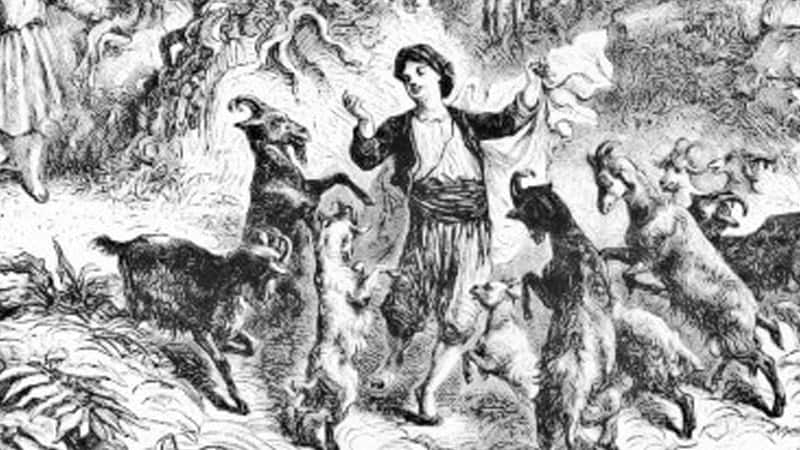
When I first started “getting into” coffee, my thoughts naturally drifted to its beginnings: Where it originally came from, how it was discovered, and who thought to drink it. Over the years I have learned a few things.
Coffee is a plant native to Ethiopia and has been known to the Oromo tribesmen of the region for centuries. They rolled ground coffee cherries with animal fat into balls to create a sort of “energy bar.” While its true origins are obscured by the passage of time, there are plenty of apocryphal (maybe a little too good to be true) stories and legends about it. My favorite origin story is the one about Kaldi the Goatherd who reportedly discovered coffee thanks to some lost, dancing goats. There are several other stories about the origin of coffee that sound plausible on the surface but do not really hold up to scrutiny. Here’s what I found.
The Legend of Kaldi the Goatherd
Another Goat Legend
The Oromos tribesmen
Coffee is for the birds
The Prophet Mohammed
The Dervish Omar
The Legend of Kaldi the Goatherd
I have read a number of variations of this legend. All of them are similar and many of the details are the same in each.
In my favorite version, it is the year 850 CE (or AD if you prefer). Kaldi is a young goat herder in charge of the family’s many goats. As you probably know, a goatherd’s primary job is to keep the herd together and safe from harm. Well, Kaldi was only so-so at this and watching goats just walking around and eating can be kind of boring. One day he fell asleep and upon waking found himself goat-less. He searched for a long time, getting more and more worried. He finally found them in a far-off area they had never gone before.
Oh no!
What he saw elevated the worry into a panic. The goats were eating leaves and red berries from a tree he had never before seen. They were also dancing about wildly. Convinced that the fruit must be poison he somehow managed to move the agitated herd away from the possibly deadly bushes. There was nothing left to do but hope for the best while expecting the worst. When the goats finally calmed down and did not die, he figured that he was the luckiest goatherd around.
Dancing with the Goats
Sometime later, once again fighting off sleep because of the boredom, he remembered the red berries from the strange bushes and their effect on the goats. Trying one for himself, he found the fruit tolerable and ended up eating a handful. The surge of energy he felt helped keep him alert and he was soon dancing along with the goats.
Everyone Must Know
Excited by his discovery, (in another version, Kaldi was a goatherd, but not a boy. In that story, his wife encouraged him) he decided to take the berries to the local Imam and to tell him about his discovery. The Imam, upon hearing about dancing goats and strange energy, determined that the fruits must be the work of the devil and threw them into the fire. Soon the monastery was filled with the intoxicating aroma of roasting coffee, bringing the other monks to investigate. A little grinding into powder and mixing with water and voilà! Coffee.
Another Goat Legend
This story comes from Yemen, just across the Red Sea from the ancient kingdom of Abyssinia, which later became Ethiopia. Although devastated by war now, Yemen traders had cornered the coffee trade through the port of Mocha for almost a thousand years. It is only natural that their origin story points to someone from their own past.
The Learned Imam
As it goes, there was a Muslim monastery that had a herd of goats. One day, the goatherd complained to the Imam that he was not able to stay awake during prayers because he was not getting good sleep. Sometimes the goats in his care would stay awake and active all night, which meant he was also awake all night. The Imam was a learned man and suspected that something that the goats were eating was keeping them awake.
Investigation
Visiting the flock, he noticed some shrubs off of which the goats had been eating both the leaves and fruit. He took a branch from one of the shrubs back to his library to see if he could identify it. There was no reference to it. It occurred to him that although they were wild now, the shrubs appeared to have been originally planted in rows. Further research led him to believe that the Queen of Sheba might have brought some of the plants with her when she visited King Solomon. Intrigued, and the Imam decided to try eating them.
Experimentation
He certainly found the red berries pleasant enough, but there was not really much in the way of fruit. Clearly, this would not have been the reason to cultivate the plants. The seeds as they were, were unappetizing. He then tried crushing and boiling the fruits and seeds. The seeds didn’t bulk up and the resulting porridge was nothing special. Knowing that roasted grains were often more appetizing, he tried putting some in the embers of his fire, where they promptly gave off that delicious aroma we all know. He crushed the kernels and again made a thick, bitter potion which he sweetened with honey.
After tasting this mixture, his heart began beating so fast that he had to lie down… but he did not fall asleep. In fact, he stayed awake and was even alert for the late-night prayers. Sharing his potion with the other monks, they all experienced the same “miracle.”
The Oromo tribesmen
Do you remember them from the top of this article with the ball of animal fat and ground coffee fruits? Well, they have two myths about coffee. One says that coffee was one of the first things brought to the earth from heaven. The other legend says that Waaga, the supreme sky god, punished one of his favorites with death (another version has him mourning over an ancestor) and upon visiting the grave, tears dropped from his eyes. The plant that emerged from the ground on this spot was coffee. The Oromos hold that all other plants are watered by rain but coffee is watered with the tears of god.
Coffee is for the birds
Two different Islamic holy men, Ghothul Akbar Nooruddin Abu al-Hasan al-Shadhili and Sheikh Umar, lay claim to having seen especially energetic birds. Trying some of the same berries and feeling energized themselves, they spread the word.
The Prophet Mohammed
According to this story, the Archangel Gabriel brought the sick Mohammed a bowl of hot dark liquid which restored his health and strengthened his spirit. In another version, it was before a decisive battle when Mohammed received his cup of coffee from the angel Gabriel. This gave him the stamina “to dismount 40 warriors and mount 40 women.” Gabriel figures in another story that tells of King Solomon entering a plague-ridden town and under the orders of the Archangel, brewing a pot of coffee to cure them.
The Dervish Omar
Omar was a healer who came to Mocha. He eventually was called upon to heal the daughter of the sheik. Falling in love, he decided that she was the girl for him, which did not set well with the sheik. He was banished from the town and found himself starving in the wilderness. When he came upon a bush with red berries, he ate them out of desperation. Strengthened by the discovery he was able to survive. When folks from the town followed him for his healing skills, he provided them a drink made of his new discovery. As word got back to the town he was eventually allowed to return. The beverage proved so popular that Omar was eventually showered with honors and was rewarded by the Caliph with a palace.
Conclusion
So, as you can see, there are plenty of stories to go around. Whether any of these stories are true or not, history shows us that the Suffi monks of Yemen did popularize DRINKING coffee. Coffee is now a worldwide beverage and any culture that has a long history with it wants to claim its discovery for its own. Pick the story you like best and go with that. I have recently found some information about a 9th-century Persian physician named Rhazes who may have been using coffee to treat patients. But then again, he must have learned the technique from somewhere… more to come as I find it!
An Invitation
Are you a fan of coffee facts? Would you like to “hang out” online with some other coffee fans? Join us at our Facebook group

